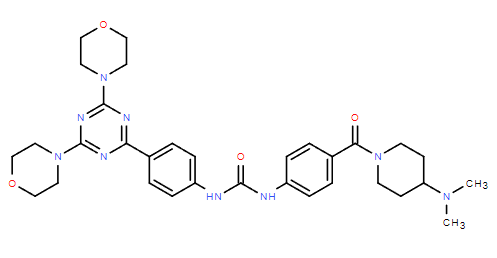
ORIGINAL COMPANY: Pfizer, Celcuity (exclusive rights to Pfizer's gedatolisib were granted to Celcuity under a global license agreement signed on April 8, 2021)
Gedatolisib was granted Fast Track status by the FDA on January 18, 2022, to treat HR+/HER2- metastatic breast cancer.
The initial patient in Celcuity's Phase 1b/2 study (CELC-G-201) that was administered gedatolisib in conjunction with Nubeqa® (darolutamide) for the treatment of metastatic desmoplasia-resistant prostate cancer (mCRPC) was successfully treated, the company announced on February 22, 2024.
The results of the phase 1b trial (NCT02684032) demonstrated that the combination of gedatolisib + palbociclib plus endocrine therapy in patients with estrogen receptor-positive/her2-negative metastatic breast cancer had a robust response rate and manageable adverse effects:
Palbociclib, letrozole, and gedatolisib were the first-line treatments given to the patients in group A. Group B included second-line CDK inhibitor-naïve patients who received palbociclib, fulvestrant, and gedatolisib. Patients in group C had previously received a CDK inhibitor and were on second- or third-line therapy; they are currently undergoing weekly treatments with palbociclib, fulvestrant, and gedatolisib. Group D patients are administered palbociclib, fulvestrant, and gedatolisib intermittently for three weeks.
Patients in group A exhibited an overall remission rate (ORR) of 85% and a median progression-free survival (PFS) of 31.1 months. Patients in group B, who had previously had endocrine therapy without CDK4/6 inhibitors, had a 77% ORR and a median PFS of 11.9 months. 66% of patients in group C had previously undergone two or more therapies; their ORR was 32% and their median PFS was 5.1 months. Finally, group D had a 63% ORR and a median PFS of 12.9 months. Three-quarters of the patients had had two or more treatments.
The most common grade 3 treatment-related adverse events and treatment-emergent adverse events were neutropenia or decreased neutrophil count (53%), stomatitis (27%), maculopapular rash (14%), and leukopenia (13%). Neutropenia (14%), leukopenia (3%), hyperglycemia (2%), and a decrease in lymphocyte count (1%), were grade 4 toxicities.